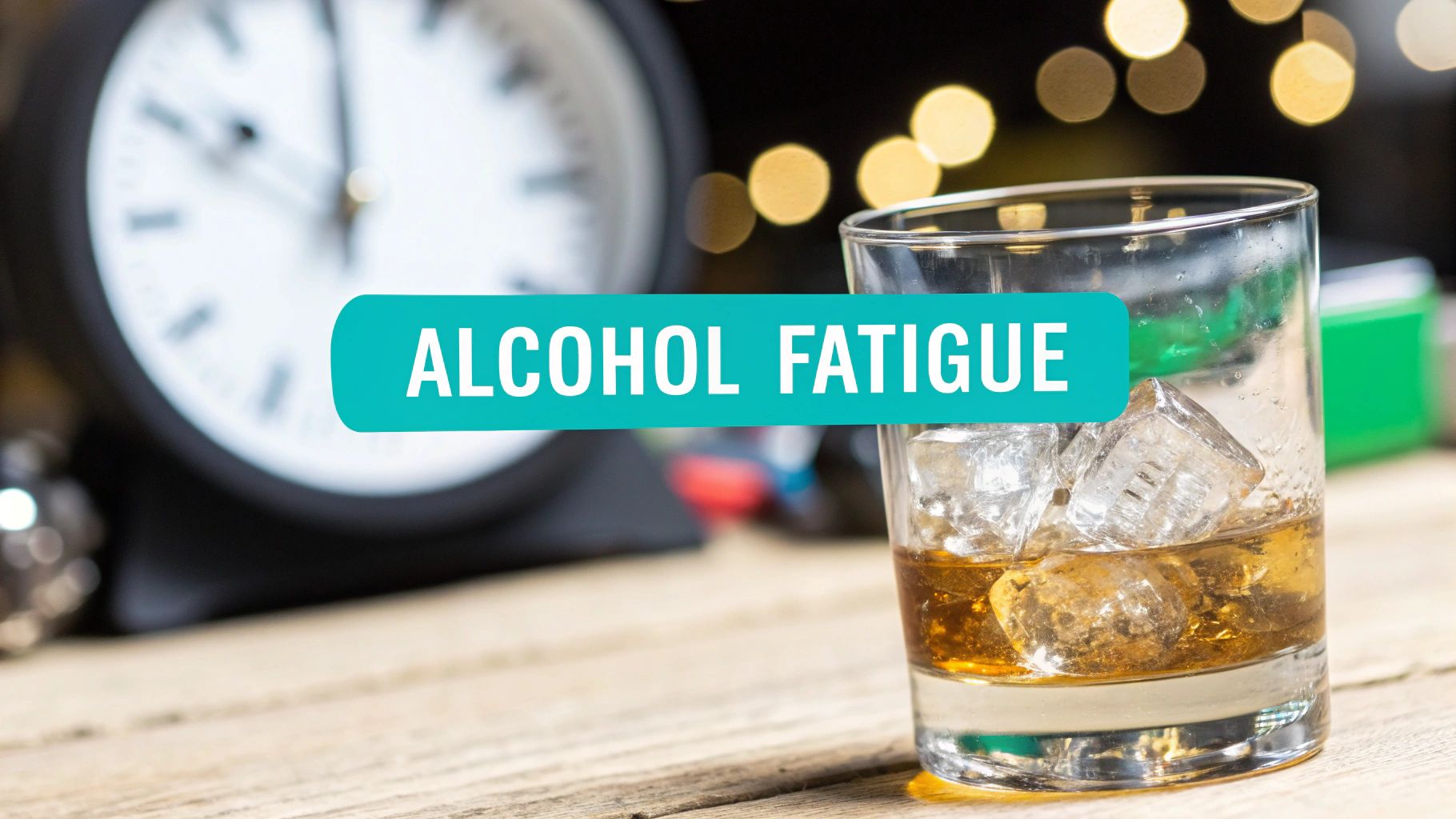

· By Annemarie
Why Does Alcohol Make You Tired? The Full Explanation
It’s a familiar story: that glass of wine with dinner or a couple of beers with friends leads to heavy eyelids and a comforting wave of drowsiness. This happens because alcohol is a central nervous system depressant, which means it slows down your brain activity and cranks up the effects of GABA, your brain's main calming chemical.
But that initial sleepiness? It’s a deceptive preview of the night ahead.
The Sedative Illusion: Why You Feel Sleepy After Drinking
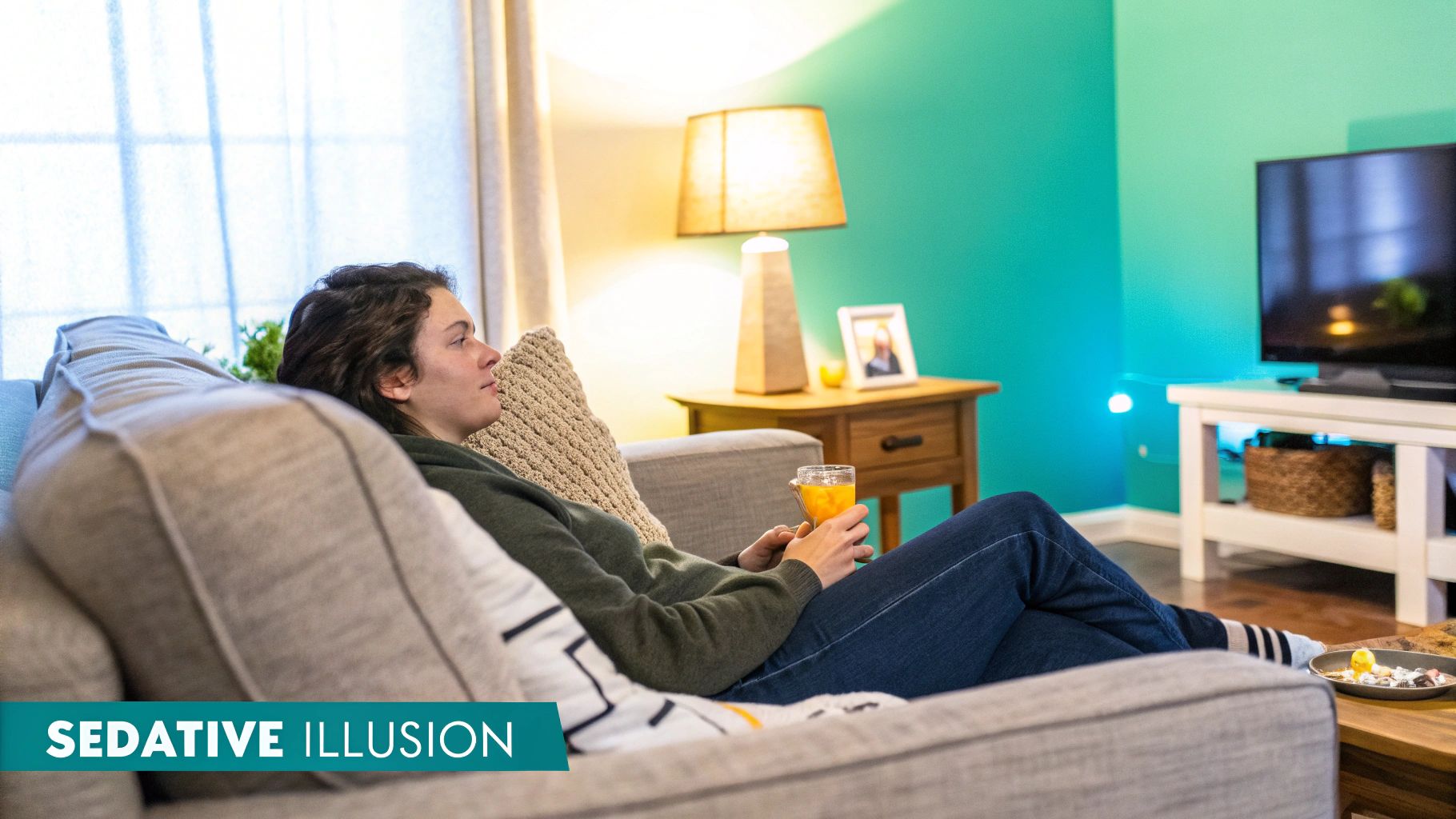
Ever notice how a drink meant to liven up your evening often ends with you fighting off a yawn? You’re definitely not alone. The question "why does alcohol make you tired?" is a common one, and the answer is all about its powerful effects on your brain and body.
Alcohol's ability to make you feel sleepy is direct and fast-acting. As soon as it hits your bloodstream, it gets to work, influencing your brain's delicate chemical balance.
This initial feeling of relaxation and sleepiness is what experts call the "sedative illusion." While alcohol can help you fall asleep faster, it seriously disrupts the quality of your sleep later in the night, which is a major reason you feel so fatigued the next day.
This trick is why so many people reach for a nightcap, thinking it helps them rest. In reality, that perceived benefit is short-lived and comes at a cost. The drowsiness you feel is just the first act of a much more complex play unfolding inside your body.
Immediate Effects On Your Energy
That quick journey from feeling social and buzzed to wanting to curl up on the couch happens because of several key factors working together. Alcohol doesn't just flip an "off" switch in your brain; it systematically messes with the systems responsible for keeping you awake and alert.
To make it simple, here’s a quick rundown of how alcohol immediately saps your energy.
How Alcohol Immediately Affects Your Energy Levels
| Mechanism | Immediate Effect on the Body | Resulting Feeling |
|---|---|---|
| GABA Enhancement | Slows down neuron activity in the brain, reducing excitability. | Relaxation, calmness, and initial drowsiness. |
| Adenosine Boost | Increases a chemical that signals to the brain that it's time to sleep. | A stronger-than-normal drive to fall asleep. |
| Nervous System Depression | Acts as a general depressant on the entire central nervous system. | Reduced physical coordination and mental sluggishness. |
Understanding these initial effects is crucial. That sleepy sensation isn't a sign that your body is gearing up for a night of deep, restorative rest.
Instead, it's a chemical trick that sets the stage for a seriously disturbed sleep cycle. As we dive deeper, you'll see how this initial sedation leads directly to restlessness, waking up throughout the night, and that all-too-familiar exhaustion the next morning. It's not just about feeling tired after a drink; it's about how that drink fundamentally changes the way you rest.
Your Brain's Chemistry on Alcohol
To really get why a few drinks can leave you feeling so drained, we have to pop the hood and look at what’s going on inside your brain. Picture your brain as a busy city intersection, with chemical messengers acting like traffic lights, telling everything when to go and when to stop. When alcohol shows up, it starts messing with those signals, creating a chemical traffic jam that leads straight to sleepy town.
Two of the biggest players in this story are GABA (gamma-aminobutyric acid) and adenosine. These are natural chemicals your body produces, and they have a massive say in your energy levels. Alcohol basically hijacks their jobs to trick your brain into feeling tired.
Alcohol Slams on the Brakes with GABA
Think of GABA as your brain’s main brake pedal. It’s what’s known as an inhibitory neurotransmitter, which is just a fancy way of saying its job is to calm things down, ease anxiety, and help you relax. When you have a drink, alcohol latches onto the GABA receptors in your brain, making them way more effective at their job.
It’s almost like alcohol hands the GABA system a megaphone, amplifying its "chill out" message across your entire brain. This supercharged braking action slows down everything—your thoughts, your reflexes, your general alertness—which brings on that classic feeling of sedation and drowsiness. This is the core reason why alcohol is classified as a central nervous system depressant.
This diagram breaks down how alcohol's effect on both GABA and adenosine creates that sedative one-two punch.
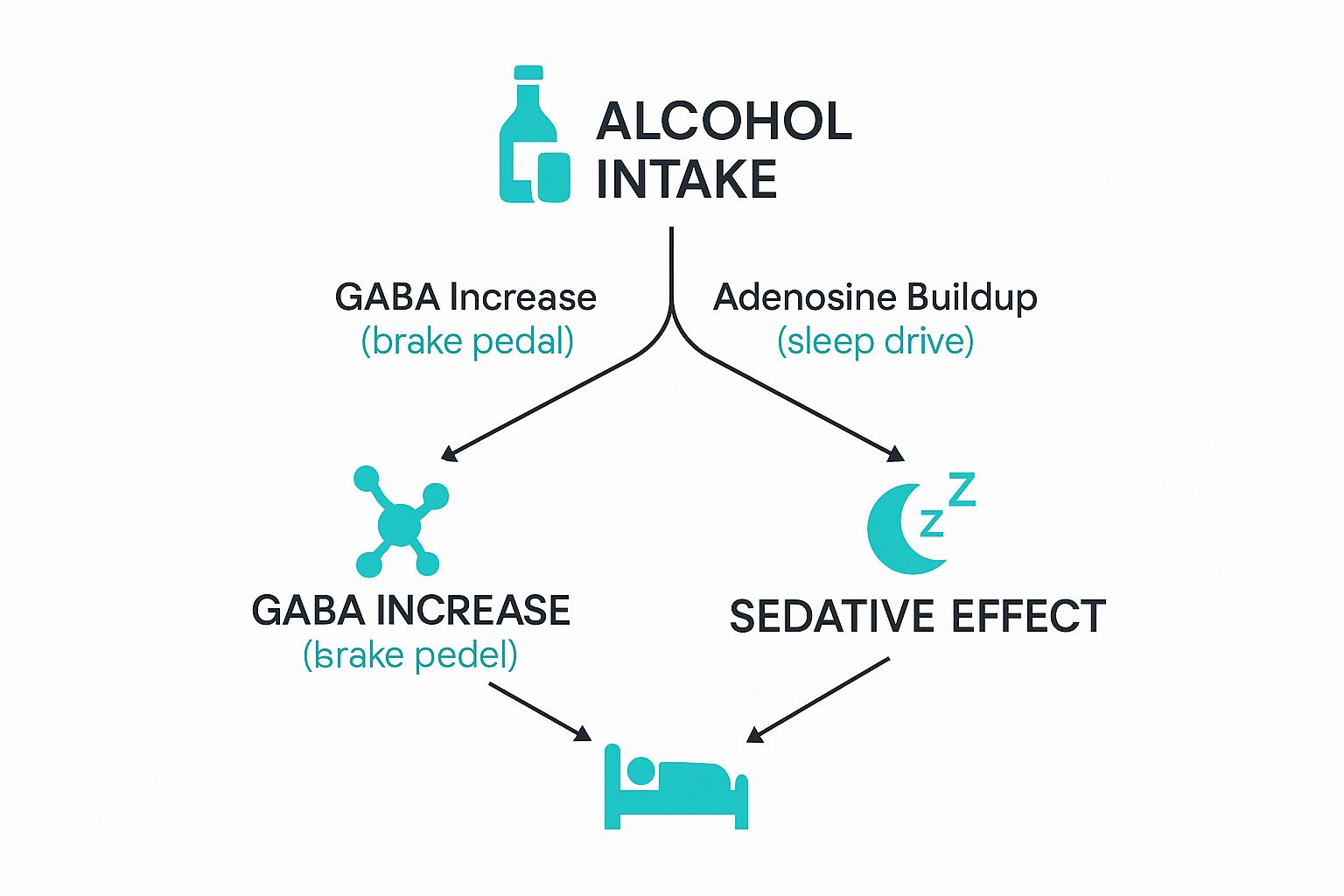
As you can see, alcohol is essentially hitting the brain's natural brake pedal and its "time for bed" button at the very same time.
The Adenosine Effect: Your Brain's Sleep Timer
While GABA is busy hitting the brakes, alcohol is also messing with another system, this one run by a chemical called adenosine. As you go about your day, adenosine levels naturally build up in your brain, which is what gradually makes you feel more and more tired. The more adenosine you have, the greater the urge to sleep—it’s your body’s built-in sleep timer.
Alcohol throws a wrench in this process by speeding it up. It actually blocks your brain from clearing out adenosine, causing it to accumulate way faster than it should.
This rapid pile-up of adenosine basically fools your brain into thinking it's been awake for much longer than it actually has. Your "sleep pressure" goes through the roof, making it almost impossible to keep your eyes open. This is exactly why a drink in the evening can feel like such a powerful, knock-out sedative.
When you combine the boost to GABA with the surge in adenosine, you get a potent chemical cocktail that practically begs you to go to sleep. The catch? As your body metabolizes the alcohol, these effects wear off, which is what leads to that notorious middle-of-the-night wakeup call.
To get a better handle on this whole cycle, you can learn more about how alcohol metabolism works and what it does to your system. It’s that metabolic rebound that turns what started as a restful evening into a night of choppy, low-quality sleep.
How Alcohol Wrecks Your Sleep Quality
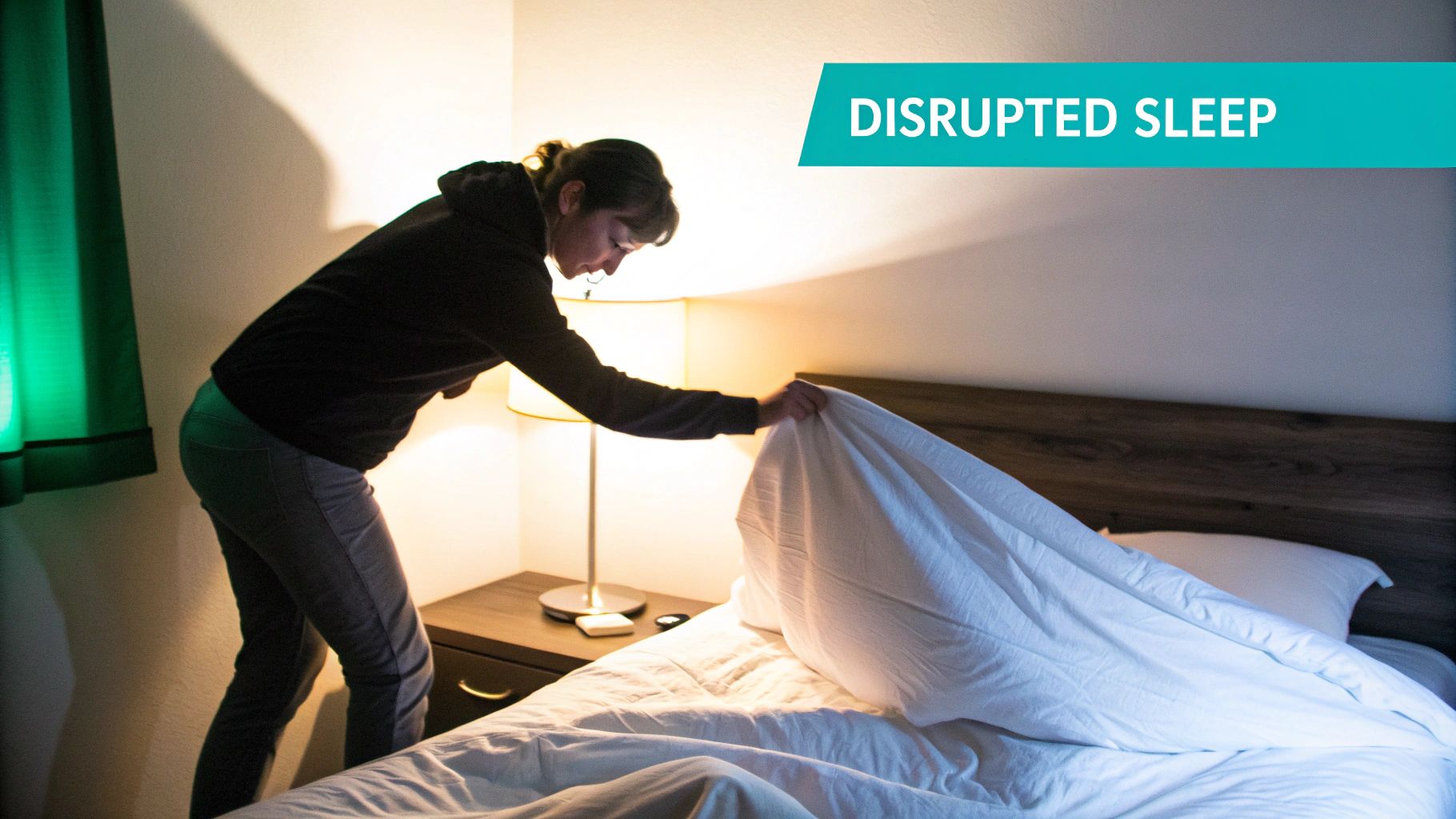
Here’s the great paradox of drinking: a glass of wine can make you feel drowsy and knock you out quickly, but the quality of that rest is often terrible. That initial sleepiness gives way to a night of tossing, turning, and fragmented sleep. This is the single biggest reason you feel so drained the next day, even if you were in bed for a full eight hours.
To really get why this happens, you have to understand your sleep architecture. It’s the natural cycle of different sleep stages your brain moves through every night. Think of it like building a house; you need a solid foundation (deep sleep) and a proper framework (REM sleep) for the whole thing to be sound. Alcohol basically comes in like a wrecking ball and messes up the entire construction process.
The biggest hit is to your REM (Rapid Eye Movement) sleep. This is the critical stage where your brain processes emotions, locks in memories, and dreams. Alcohol is notorious for suppressing REM sleep, especially during the first half of the night.
This creates a major problem later on. As your body starts to process the alcohol, your brain realizes it's been short-changed on REM and tries to play catch-up. This triggers what’s known as the "rebound effect."
The Rebound Effect and Waking Up All Night
This rebound effect is your brain’s frantic attempt to get back the restorative REM sleep it missed. This scramble causes a surge in brain activity, yanking you out of deep sleep and into a much lighter, more restless state.
Sound familiar? This is exactly why you find yourself waking up multiple times in the middle of the night after drinking. The sedative effect has worn off, and now your brain is overstimulated and bouncing off the walls. These frequent wake-ups, even if you don’t remember them all, completely shatter your sleep.
The result is waking up feeling mentally foggy and physically exhausted, as if you barely slept a wink.
The Slippery Slope to Insomnia
This cycle of disruption can easily spiral into a chronic problem. There's a strong link between regular drinking and sleep disturbances, and for many people, it can either trigger or worsen insomnia.
In fact, as many as 75% of people with alcohol dependence struggle with falling or staying asleep. It’s a vicious cycle: you drink to help you fall asleep, but that drink leads to poor-quality rest, which makes you more tired and feel like you need another drink the next night.
Ultimately, that crushing tiredness isn't just from the booze itself—it's from the chaotic, low-quality "sleep" it forces on your brain. If you're looking for ways to get better rest after a night out, you’ll want to check out our guide on how to sleep better after drinking.
The Roles of Dehydration and Blood Sugar in Fatigue
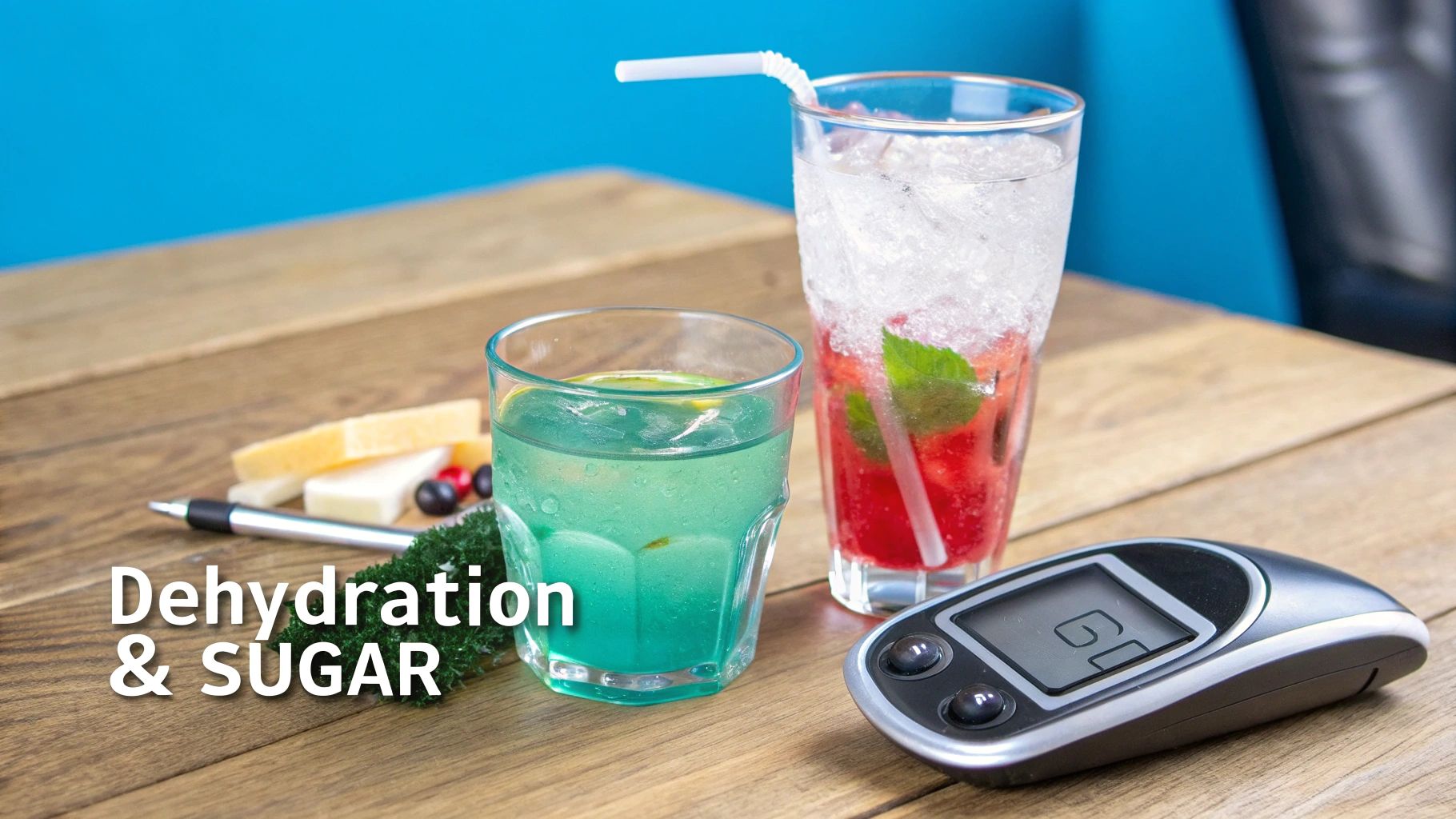
While alcohol's direct hit on your brain chemistry is a huge part of why you feel tired, that's only half the story. The physical toll it takes—specifically through dehydration and wild blood sugar swings—is just as powerful at draining your energy.
Think of your body like a high-performance engine. It needs the right balance of fluids and fuel to run smoothly. Alcohol manages to throw both of those critical systems completely out of whack. The result is a full-body exhaustion that goes way beyond just feeling a little sleepy.
The Dehydration Drain
Alcohol is a classic diuretic. In simple terms, it makes you pee a lot more than you normally would. For every drink you have, your body can flush out several times that amount in fluid, which is what kickstarts alcohol-related dehydration.
This isn't just about feeling thirsty. When you lose that much water, you’re also losing essential electrolytes like potassium and sodium—the very things your muscles need to function and produce energy. When those levels drop, you’re left feeling weak, sluggish, and often with a pounding headache.
Your body is working overtime just to rebalance itself after losing so much fluid, and that effort alone is incredibly tiring. This is a key reason the fatigue from drinking feels so physical and persistent.
If you want to get into the nitty-gritty of it, you can learn more about how alcohol dehydrates you in our detailed guide. Getting a handle on this is your first step to fighting that next-day drag.
The Blood Sugar Rollercoaster
Let's talk about sugar. Many alcoholic drinks, especially cocktails, wine, and beer, are loaded with it. When you drink them, your blood sugar spikes, giving you that temporary burst of energy. You might feel more lively and animated for a bit, but that initial high is setting you up for a massive fall.
Your body sees all that sugar and floods your system with insulin to bring your levels back down. The problem is, it often overcorrects.
This leads to the infamous "crash." Your blood sugar plummets, leaving you feeling way more drained and tired than before you even had a drink. This rollercoaster effect is a major contributor to why alcohol makes you tired, especially a few hours after you've stopped drinking.
When you put a dehydrated body and crashing blood sugar together, you have a potent recipe for exhaustion. You're not just mentally tired from bad sleep; your body is physically depleted and scrambling to find its balance again.
How Does Alcohol-Induced Fatigue Differ Between Men and Women?
Ever wonder if that glass of wine at dinner hits everyone the same way? The science is in, and it’s a clear no. When we ask, "why does alcohol make you tired," there's no single, simple answer. How you experience that post-drink slump is deeply tied to your own biology, and gender plays a surprisingly big part in the whole equation.
The physiological differences between men and women, like body composition and how fast we metabolize things, have a direct impact on how our bodies process alcohol. For example, women typically have less body water and a higher percentage of body fat than men. Since alcohol is water-soluble, it ends up being more concentrated in a woman’s system, meaning the same amount of alcohol can pack a bigger punch.
Sleep, Gender, and a Night of Drinking
These biological differences don't just stop at how you feel right after a drink—they follow you to bed. Research shows that alcohol’s disruptive effects on sleep can play out differently for men and women, especially when heavy drinking is involved.
It’s a complex relationship. Studies have found that for men, heavy drinking is directly linked to poor sleep quality, including trouble staying asleep and getting fewer hours of shut-eye overall. Interestingly, women who drink don't always show that same direct link, though they might feel more out of sorts the next day. The data is pretty stark: men who drink more than 21 units of alcohol a week are far more likely to wake up multiple times during the night compared to non-drinkers. You can dive deeper into the study on the gendered links between alcohol and sleep quality if you're curious.
This screenshot from the research really highlights the gap in sleep problems between male heavy drinkers and their non-drinking counterparts.
The numbers make it obvious: men who are heavy drinkers report significantly more trouble staying asleep through the night.
Figuring Out Your Personal Reaction
At the end of the day, getting a handle on these nuances gives you the full picture. While the main culprits—GABA, adenosine, dehydration—are the same for everyone, your body’s specific response is all your own.
Here are a few factors that contribute to these gender-based differences:
- Body Water Percentage: Less water in the body, which is typical for women, means a higher blood alcohol concentration.
- Enzyme Activity: We all have a liver enzyme called alcohol dehydrogenase (ADH), but differences in its activity can change how quickly alcohol gets broken down.
- Hormonal Fluctuations: For women, shifting hormone levels can also influence sensitivity to alcohol and how tired it makes them feel.
Realizing that your personal reaction to alcohol is shaped by your unique biology is a game-changer. This knowledge empowers you to make smarter choices, helping you manage your energy and feel your best when you decide to have a drink. It's not just about what you drink, but about understanding how your body is built to handle it.
How to Minimize Alcohol-Related Fatigue
Okay, so now you know the science behind why a few drinks can leave you feeling completely wiped out. That’s the first step. The next, and most important, is actually doing something about it.
Of course, the best strategy is always moderation. But let's be real—sometimes you want to enjoy a social drink without writing off the entire next day. The good news is, a few practical habits can make all the difference.
These strategies aren't about magic cures; they're about supporting your body's own processes. We're talking about simple ways to lessen the disruptive impact alcohol has on your sleep, hydration, and blood sugar. A few smart choices before, during, and after you drink can drastically change how you feel when your alarm goes off.
Strategic Hydration is Your Best Friend
Remember how alcohol is a diuretic? That’s a major reason you feel so drained—it’s literally flushing essential fluids and electrolytes out of your system. You can get ahead of this by making hydration a non-negotiable part of your night.
The easiest rule to remember? Alternate every alcoholic drink with a full glass of water.
This simple move pulls double duty: it naturally slows down how much alcohol you're consuming while constantly replenishing the fluids you’re losing. It’s all about helping your body stay balanced and reducing the strain that leads to that classic next-day exhaustion.
Proactive Nutritional Support
What you put in your body besides alcohol matters—a lot. Since we know alcohol depletes key nutrients and dehydrates you, getting ahead of the curve by replenishing them is a total game-changer. This is exactly where a targeted solution like Upside comes in.
Formulated with a powerhouse blend of vitamins and electrolytes, Upside goes straight to the root causes of that tired, run-down feeling. It’s designed to restore what alcohol takes away, giving your body the support it needs to recover so you can wake up feeling refreshed and ready to go.
Tossing back an Upside Hangover Jelly stick before you hit the pillow is a simple, proactive step to arm your body for a better morning.
More Tips for a Better Morning
Beyond just water and supplements, a couple of other smart choices can help you sidestep feeling drained after a night out. Think of these as small adjustments that can have a big payoff for your sleep quality and energy levels.
-
Eat a Balanced Meal: Never, ever drink on an empty stomach. A solid meal with protein, healthy fats, and complex carbs helps slow down how quickly your body absorbs the alcohol. This prevents those wild spikes and crashes in blood sugar that leave you feeling awful.
-
Choose Your Drinks Wisely: Try to stick with drinks that are lower in sugar. Clear liquors like vodka or gin mixed with soda water are much better choices than super-sugary cocktails or sweet wines. Those sugary drinks just add fuel to the blood sugar rollercoaster.
-
Give Your Body Time: Call it a night on the drinks at least a few hours before you actually plan to go to sleep. This gives your body a head start on metabolizing the alcohol, which means it won't be as disruptive to those all-important REM sleep cycles you need to feel rested.
Got Questions About Alcohol and Tiredness?
Let's wrap this up by hitting a few of the most common questions people have about that sleepy feeling that comes with drinking.
Does the Type of Alcohol Matter?
It sure does, but maybe not in the way you think.
Drinks that are loaded with sugar, like a lot of cocktails, can set you up for a nasty blood sugar crash that makes you feel even more tired. Darker liquors also have more congeners—nasty little compounds that are famous for making hangovers worse.
But at the end of the day, the main sedative effect comes from ethanol itself, and that’s in every single alcoholic drink.
Why Do I Feel Tired After Just One Drink?
Sometimes, one drink is all it takes to kick off that chemical domino effect in your brain—the one where GABA and adenosine start telling you it's bedtime.
How hard it hits you really depends on a few things: your personal sensitivity, what you've eaten recently, and how hydrated you are. They all have a major say in how you'll feel.
Can I Build a Tolerance to Feeling Tired?
Nope. While you might feel like you can "handle your liquor" better over time, you can't build a tolerance to the damage alcohol does to your sleep quality. That part never gets better.
Instead of just dealing with the fatigue, why not get out ahead of it? Upside Jelly Sticks are packed with the essential electrolytes and vitamins your body loses when you drink. They're designed to help you wake up feeling refreshed and ready to take on the day.
Go ahead and reclaim your mornings. Check us out at https://enjoyupside.com.
#upside #enjoyupside #upsidejelly #livemore #hangovercure #hangoverprevention #fighthangovers #preventhangovers #HangoverRelief #MorningAfter #PartySmarter #HydrationStation #WellnessVibes #RecoverFaster #NoMoreHangovers #HealthyParty #HangoverHacks #FeelGoodMorning #NightlifeEssentials #HangoverFree #SupplementGoals #PostPartyPrep #GoodVibesOnly #HealthAndParty #HangoverHelper #UpsideToPartying
